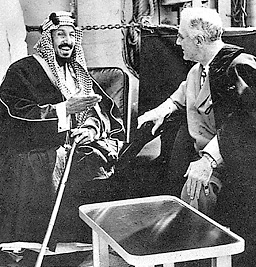Ibn Saud << `ihb` uhn sah OOD >> (1880?-1953) became one of the most important absolute monarchs of his day. He created Saudi Arabia and became its king in 1932. This nation in southwestern Asia includes Mecca, the holy city of the Muslims, and some of the richest oil fields in the world (see Saudi Arabia).

Abd al-Aziz ibn Saud was born in Riyadh in central Arabia. His family, which once ruled much of Arabia, lost influence and was driven from its home in 1891. But, in a daring exploit, Ibn Saud recaptured Riyadh in 1902 and began his career as a leader. He defeated Sharīf Hussein, the ruler of Mecca, in 1924. Mecca was in the kingdom of Hejaz, which Ibn Saud added to his conquests. He was proclaimed king of Hejaz in 1926. In 1932, he united all the territories over which he had gained control into the single kingdom of Saudi Arabia.
Oil was discovered in the eastern part of Saudi Arabia in the early 1930’s. Ibn Saud allowed United States oil companies to lease oil fields in his country. Sizable amounts of oil were not produced until after 1945, when World War II ended. Oil exports then climbed to the rate of more than 1 million barrels a day.
In his last years, Ibn Saud grew feeble and almost blind. Two of his sons, Saud and Faisal, handled the affairs of state (see Faisal). Ibn Saud died on Nov. 9, 1953.
